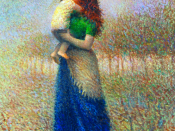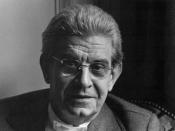Joseph M. Fowler
27 Apr 04
Personality Theories
Judy Powers
Melanie Klein (1882 -1960):
She started the shift in emphasis away from studying innate biological instincts and towards relations between people. She described how, primarily because of anxiety over aggressive impulses, children split objects and feelings into good and bad aspects in an effort to retain good ones as part of the self while getting rid of bad ones by projecting them onto others. Splitting of an object image into opposites in the internal world of fantasy permits children to treat the internalized object as clearly good or bad while continuing to trust and love the actual external person who is an intricate combination of both. Children attempt to keep the good feelings and project the bad feelings onto others. Eventually, the split between the nurturing and the frustrating mother becomes the starting point of a child's concept of "good me" and "bad me".
This spitting can often cloud a child's subjective and objective perception and lead to distortion with other people.
Our personality is shaped by our relationships with significant others in object relations theory. She thinks that we begin life with certain predispositions but with not real sense of self or identity. Through interactions with significant others, we take into ourselves parts of others and begin to build a self-structure.
Klein was also more interested in the reality of the "inner world" than that of the " outer world" Her preference has resulted in that object relations theory has been helpful in understanding psychotherapy and the interest in object relations has become particularly important as a framework for understanding some syndromes that have become a part of our popular clinical literature.
Margaret Mahler (1897 -1985):
In object relations theory, human development is a lifelong process of emerging out...



Impressive
very impressive, but try looking at it from the bigger picture and coming in from differant persperctives
2 out of 2 people found this comment useful.